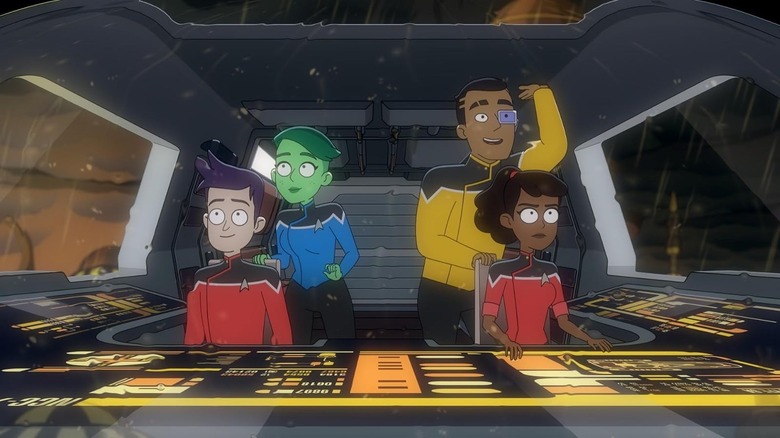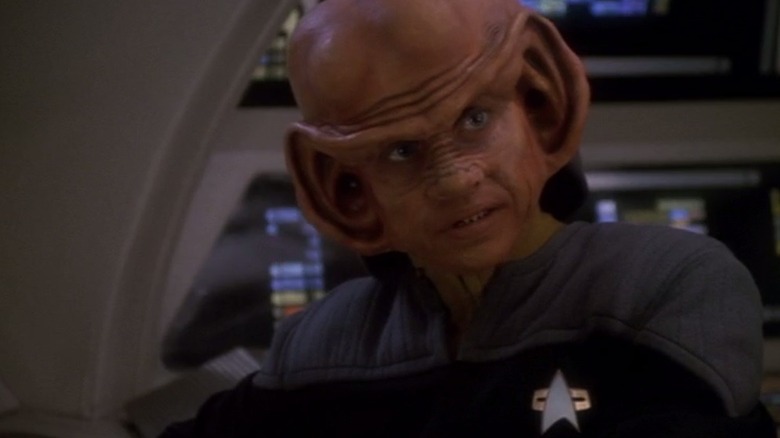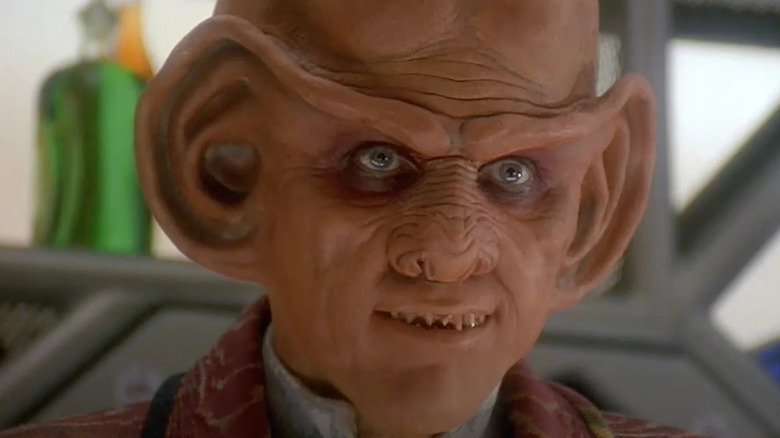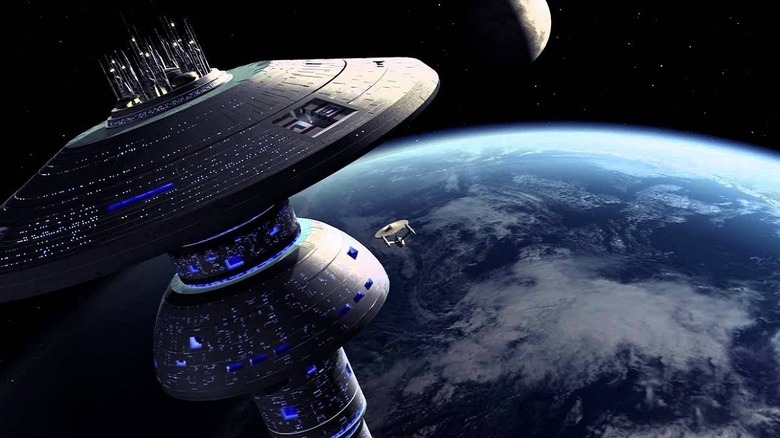Star Trek: Lower Decks Takes One Major Alien Race Where No Other Show Has Gone Before
This post contains spoilers for the latest episode of "Star Trek: Lower Decks."
The Ferengi have popped up a few times before on "Star Trek: Lower Decks." Back in last season's "Hear All, Trust Nothing," when the USS Cerritos visited Deep Space Nine, we got to check back in on everyone's favorite bartender Quark (Armin Shimerman). In this season's latest outing, "Parth Ferengi's Heart Place," we again meet his younger brother, Rom (Max Grodénchik). Continuing on from where "Deep Space Nine" left off, Rom is the Grand Nagus (Chief Executive) of Ferenginar.
Why is the Cerritos visiting the Ferengi homeworld? Because Rom has plans to bring his homeworld into the Federation. This is quite an about-face for the Ferengi. They were introduced as villains in season 1 of "The Next Generation," but poor reception turned them into comic nuisances. It was "Star Trek: Deep Space Nine" that gave them depth, and transformed them into far more compelling characters.
"Star Trek" is set in an idealized socialist future; resource scarcity and wage labor are things of the past. Federation citizens work for personal growth, satisfaction, and collective good. The Ferengi are unrepentant capitalists; "profit" is a holy word in their language and they share the "Greed is good" ethos of Gordon Gekko.
"Lower Decks" making such a consequential decision with the Ferengi proves that the show, contrary to its title, won't settle for sitting on the sidelines of the "Star Trek" canon.
The Ferengi's face turn
It's fitting that Rom is bridging this gap between his people and the Federation. "Deep Space Nine" already suggested he'd be a reformist Grand Nagus — plus, his son Nog (the late Aron Eisenberg) was the first Ferengi to join Starfleet.
Nog was close to humans from almost his first appearance; in "Deep Space Nine" episode four, "A Man Alone," he befriends Jake Sisko (Cirroc Lofton) and his new friend teaches him how to read. In the season 3 episode "Heart of Stone," he asks Jake's father Ben Sisko (Avery Brooks) to write him a recommendation letter for Starfleet Academy. The source of his interest? "[He] doesn't want to end up like his father."
Nog explains: Rom's talent was engineering, something that he's inherited from his dad. Ferengi society, though, demands all its men be businessmen. Nog wants to join Starfleet precisely because profit won't be a concern. The Ferengi had already become more endearing in "Deep Space Nine," but Nog's explanation gives them true depth. They're not all money-chasing drones — they're individuals, and their culture doesn't have to control who they are.
The Ferengi are very human aliens
Nog ships out to Starfleet Academy in season 4 and returns as an Ensign (Jake, on the other hand, opts out of Starfleet and becomes a journalist). He serves on Captain Sisko's ship, the Defiant, and fights in the Dominion War (he even loses a leg in "The Siege of AR-558").
Nog proves his valor by serving in Starfleet, but even the Ferengi's vices are quite human (or "hew-mon" as they say). 20th-century humans to be precise, before we did away with money. In the season 2 finale "The Jem'Hadar," Quark declares to Sisko, "We're a constant reminder of a part of your past you'd like to forget."
"Deep Space Nine" doesn't let its hew-mon characters off the hook for their prejudice. In the aforementioned episodes pairing Sisko with Quark and Nog, he learns his lesson about being judgmental. There's reciprocity too; in "Way of the Warrior," Quark compares the Federation to root bear, a sickeningly sweet beverage by Ferengi standards, but "if you drink enough of it, you begin to like it [...] Just like the Federation."
What does Federation membership mean?
Even with mended fences, do the Ferengi qualify for Federation membership? Some tenets mentioned in the past include sufficient technology (i.e. warp drive), a unified planetary government, and no internalized discrimination. The Ferengi check the first two boxes, at least. They've traditionally treated their women like chattel, but that changed under Rom's predecessor Zek (Wallace Shawn) thanks to the influence of his new bride: Quark and Rom's mother Ishka (Cecily Adams).
However, I still sense cultural incompatibility. The Federation is, again, a socialist state and an egalitarian democracy. There have even been jokes in "Lower Decks" about how the Starfleet characters don't understand money. The Ferengi are still capitalists, though, and not democratic ones: the Grand Nagus chooses his successor and maintains his power through wealth. Where Starfleet sees newly met races as potential friends, the Ferengi see only marks.
Take note of when this episode of "Lower Decks" mentions it would be impossible for Qo'noS, the Klingon homeworld, to join the Federation. Yet, the Federation has been allied with the Klingons for much longer than the Ferengi. The thing is, it takes more than mere friendship to join the club. The Klingons are a feudal warrior race; they have mutual interests and respect with the Federation, but they don't want to forfeit their culture.
This is probably why the episode stresses the Ferengi are just applying for membership — Zek and Rom's reforms are a first step, but they have a long road ahead. Once again, the cultural bridging goes both ways. Rom and his Bajoran wife Leeta (Chase Masterson) purposefully drive a hard bargain, slanted in their favor, during the negotiations to ensure the Federation aren't suckers. Captain Freeman (Dawnn Lewis), the rare Starfleet officer with the lobes for business, proves they aren't.
"Star Trek: Lower Decks" is streaming on Paramount+.



